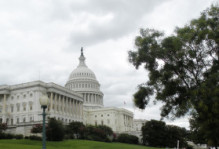Leadership: What I Learned During the DC Summer Institute on Leadership, Part 2
Interviews
Mike Curtain was an obvious choice. He is the CEO of one of DC’s most recognized and successful non-profit organizations, which employs over 150 people. He’s very experienced with more than 15 years in the culinary industry prior to becoming DCCK’s CEO, a position he has had for the past 10 years. During his tenure, the organization has started a number of new, successful initiatives, expanded their Culinary Job Training Program, developed a revenue stream to ensure the organization’s sustainability, and serves more meals than ever to the homeless shelters, transitional housing, treatment programs, and public schools of Washington D.C. – 10,000 made-from-scratch meals served daily.
Sarah Riley is the Culinary Job Training Program Manager. She is 28 years old, the same age I was when I first felt I was actually being a leader, and has been working at DCCK for two years. Sarah only recently received this promotion, thanks to her hard work as the Recruitment & Intake Coordinator, and manages just two people. As we worked together during my summer internship, Sarah became a good friend to me, but friendship is not why I chose her. I chose her because she is different from a traditional leader-type like Mike. Sarah is young and inexperienced as a leader, but she is intelligent, hard-working, and compassionate.
Philosophy/Aspects of Leadership
After reluctantly willing to classify himself as a leader, Mike succinctly said that his philosophy of leadership is to put people in a position to do what you want them to do because they want to do it, not because you want them to. This was almost a direct translation of the Lao-Tzu quote.
Sarah answered that her philosophy of leadership and important aspects include: good communication (including giving feedback and making your expectations clear), being fair, open, and just, making oneself approachable and available for the team, being flexible, and having a positive, “can do” attitude. I really enjoyed the details of Sarah’s answer. The commonality among her answers was primarily communication, which is the number one sought-after skill by employers.
Personal Characteristics Valued in Employees
Mike quickly answered, “Honesty and Loyalty,” and followed up saying that he viewed disloyalty the same as betrayal, stating it was intolerable. Sarah also answered with honesty as her first descriptor. She also said these characteristics were important: being a hard-worker, being visionary enough to understand the big picture, being at work when you’re at work (not focusing on personal matters), and having a pleasant attitude. Despite their difference in tenure, the value of integrity was most important for both, and I also liked how Sarah looks for people who work hard and can see beyond their own desk full of work.
Greatest Challenges as a Leader
Mike came to DCCK with no non-profit experience, following the DCCK legend and founder Robert Egger, and there were some who felt he wasn’t the right person to be taking over. He responded to this challenge by jumping right into the job. He talked to everyone he could and attended every meeting he could so that he could learn about the work everyone was doing. He was understanding and respectful to every employee, including those who felt he didn’t deserve the CEO position. He knew he needed to prove that he could handle the job, and this proving point happened 16 weeks after his hiring.
During a Thanksgiving turkey drive, a refrigerator broke down, which prevented DCCK from taking on donations. There were people showing up with Thanksgiving Turkey, but no place for it to be safely stored. Other staff members wanted to wait for a new refrigerator to be donated instead of buying one because of the organization’s tradition of reliance on donors and limited funds. The Kitchen had to turn donors away because of this storage problem, and Mike had had enough. He started a fundraiser to buy a new refrigerator, which ended up raising more than enough money for a new fridge, and DCCK opened its doors to all the people who wanted to donate turkeys. There was a line of people going around the whole block of 2nd & D St. Mike jumped in and helped the staff unload trucks that were bringing in donated turkey and loaded it into their new fridge. All of this was accomplished in time for Thanksgiving too, and it became a turning point where Mike had earned the respect of his former doubters and proved himself a capable leader. He had a great attitude despite the situation. Positive attitude, hard work, and problem solving helped Mike overcome his challenge.
That’s a tough story to follow for Sarah, who is a newly promoted leader, but her challenge is of equal merit. As a 28 year old managing staff twice her age, Sarah says that her greatest challenge will be coordinating what she wants done with her staff. She will have to learn to “let little details go” and let her staff “do things in their own way” while still achieving her end goals. This is what Lao-Tzu, the ancient philosopher, said 2400 years ago. As a perfectionist, which was newly defined for Sarah when I started work with her, I can empathize with her on the need to let the little details go.
Lessons Learned
When asked what lessons has he learned while working at DCCK, Mike recalled a story of a volunteer, an old, white man who was a retired CIA officer. The man was going to be working with Culinary Job Training students, who often come from backgrounds of incarceration, chemical addiction, and poverty. The man came to Mike exclaiming, “How am I going to relate to these students?” Mike replied with what the Kitchen has taught him: The people coming through the CJT program can tell if you’re being honest, genuine, and really care. You have to have true sincerity and conviction. That’s all you need to relate to them.
I thought this was a great lesson. I do not have the same problems as most when it comes to relating to the CJT students, and I was glad to learn that a number of the CJT staff members also come from tough, heart-breaking backgrounds. However, I agree with Mike that it is easy to see when someone really cares about your well-being. When we see that, you can begin to earn our respect and trust.
Sarah’s initial comments were more focused on interactions with co-workers. She said that DCCK has taught her how important problem solving skills are, to be flexible, and that you never know what is going on with someone personally, so don’t be quick to judge. Sarah’s answer, with respect to interactions with co-workers, was to be professional, a quality that really drives her as a person. I also admired her compassion expressed in the comment about avoiding judgment of others because you never knowing what’s going on with them.




No comments.
Comments are currently closed. Comments are closed on all posts older than one year, and for those in our archive.